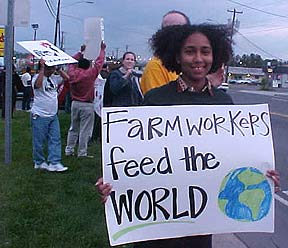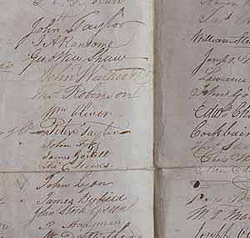
 IN BRIEF: The CIW is launching a national petition drive to demand that Burger King and other food industry leaders work with the CIW to improve the wages and working conditions of the workers who pick their tomatoes, and join with the CIW in an industry-wide effort to eliminate modern-day slavery and human rights abuses from Florida’s fields. The petitions will serve as notice that those who sign are “prepared to stop patronizing Burger King now, and other food industry leaders in the future, should they fail to do so.” The campaign comes on the 200th anniversary of the US ban against the importation of slaves, and echoes key strategies of the early abolitionist movement that helped hasten the end of slavery in the 19th century. IN BRIEF: The CIW is launching a national petition drive to demand that Burger King and other food industry leaders work with the CIW to improve the wages and working conditions of the workers who pick their tomatoes, and join with the CIW in an industry-wide effort to eliminate modern-day slavery and human rights abuses from Florida’s fields. The petitions will serve as notice that those who sign are “prepared to stop patronizing Burger King now, and other food industry leaders in the future, should they fail to do so.” The campaign comes on the 200th anniversary of the US ban against the importation of slaves, and echoes key strategies of the early abolitionist movement that helped hasten the end of slavery in the 19th century.
Click here to read the petition and sign now!
Click here to download the petition and start collecting signatures today!
Click here to learn how you can bring the petition campaign to your community!
"Slavery, plain and simple"
A federal indictment filed on January 17th of this year charged six people for their roles in a violent farm labor operation based in Immokalee, Florida. US Attorney Doug Molloy called the operation “slavery, plain and simple” (Ft. Myers News-Press, “Group accused of keeping, beating, stealing from Immokalee laborers” 1/18/08).
The employers were charged with beating workers who were unwilling or unable to work or who attempted to leave their employ, holding workers in debt, and chaining and locking workers inside u-haul trucks as punishment ("How about a side order of human rights?" Miami Herald, 12/16/07). The workers picked tomatoes on Immokalee area farms.
This latest slavery case was the seventh such prosecution to emerge from Florida’s fields in the past ten years.
Standing together - as workers and consumers - we can make it the last.
Some Historic Perspective: The Early Abolitionists
In 1787, the people of Manchester, England, delivered a petition containing more than 10,000 signatures – almost one in every five people in Manchester at the time – to the British House of Commons, demanding that the British government outlaw the brutal Transatlantic Slave Trade. Hundreds of thousands more British citizens followed suit, carrying so many petitions to Parliament that at one point it threatened to bring the House of Commons to a halt.
The unfurling of the Manchester petition in London marked the launch of an unprecedented popular campaign that – in conjunction with innumerable slave revolts and full-scale rebellions across the Atlantic that shook the very foundation of the barbaric institution – would eventually result in the abolition of the British slave trade in 1807.
It also marked a watershed moment in the birth of the modern human rights movement. The British abolitionist campaign introduced many of the tools used today in efforts to protect and expand human rights, from the mass petition drive to the consumer boycott, as hundreds of thousands of British consumers refused to purchase sugar produced by slave labor.
The Enduring Shame of Forced Labor
Modern-day slavery - people forced to work for little or no pay through violence and threats of violence - continues to plague the US agricultural industry. The particularly high incidence of prosecutions in Florida prompted one federal prosecutor to call the state “ground zero for modern-day slavery” in the New Yorker magazine (“Nobodies: Does slavery exist in America?” 4/03). Many of these cases were tried under anti-peonage laws passed just after the Civil War during Reconstruction.
 But modern-day slavery does not occur in a vacuum. Rather, it is simply the most extreme form of exploitation made possible by the poverty and powerlessness facing the vast majority of Florida farmworkers every day they go to work in the fields. In the words of US Senator Bernie Sanders, following his recent visit to Immokalee, "the norm is a disaster, and the extreme is slavery." But modern-day slavery does not occur in a vacuum. Rather, it is simply the most extreme form of exploitation made possible by the poverty and powerlessness facing the vast majority of Florida farmworkers every day they go to work in the fields. In the words of US Senator Bernie Sanders, following his recent visit to Immokalee, "the norm is a disaster, and the extreme is slavery."
Farmworkers are among the poorest workers in the United States and have very few labor protections. Most workers earn sub-poverty wages and do not have the legal rights to overtime pay, to organize and to bargain collectively. In 2001, the Department of Labor termed farmworkers "a labor force in significant economic distress." These sweatshop conditions are the fertile ground in which slavery continues to thrive.
The corporations that have come to dominate the trillion-dollar US food industry over the past fifty years – companies like Burger King, WalMart, Subway, and Costco – have not only profited from the exploitation of the country’s farmworkers, in the form of low-priced produce, but have actually contributed to that exploitation through their volume purchasing practices. By leveraging the purchasing power of thousands of stores and restaurants, these huge chains are able to drive down prices at the farm gate (the price paid to the grower), which in turn drives down wages in the fields, as growers pass the cuts on to their labor to protect their own profits ("Like Machines in the Fields: Workers without Rights in American Agriculture," Oxfam America, 3/04).
U.S. Bicentennial
In 2007, the British bicentennial of the end of the Transatlantic Slave Trade was celebrated throughout Great Britain with museum exhibits, conferences, and public events. The celebrations were intended to both remember that groundbreaking victory and to call attention to the ongoing fight against slavery in its contemporary forms.
 |
| "East India Sugar not made by Slaves," was a common advertising slogan during the late 1700's in England as the abolitionist movement led a highly successful sugar boycott. One educational pamphlet, "Address to the People of Great Britain on the Utility of Refraining from the Use of West Indian Sugar and Rum," written by a leading abolitionist, Thomas Clarkson, set a publishing record for the time: 50,000 copies were distributed in the UK in only four months. |
As part of those bicentennial celebrations, Anti-Slavery International, the world’s oldest human rights organization and the living legacy of the British abolitionist movement, recognized the CIW for its leadership in the fight against forced labor with its prestigious 2007 Anti-Slavery Award. In accepting the Anti-Slavery Award on behalf of the CIW, Lucas Benitez declared:
"In the tradition of the abolitionist movement here in Great Britain, where consumers and workers joined to demand sugar free of the scourge of slavery and so helped bring an end to the slave trade, we are building an alliance of workers and consumers today in the United States to demand Fair Food and an end to slavery in its modern-day form."
2008 is the bicentennial of the end of the slave trade into the United States. The US followed Britain in banning the importation of slaves effective January 1, 1808, marking an important first step toward limiting, and eventually abolishing, slavery nearly 60 years later. Sadly, no commemoration is planned in this country (“Forgotten Step Toward Freedom,” New York Times, 12/30/07).
The fight against slavery in the US - against both the barbarity of 19th century chattel slavery and the humiliating and often brutal forms of forced labor that continue to thrive today - must not be ignored.
A Petition to End Sweatshops and Slavery in Florida's Fields!
The CIW is launching a national petition drive to demand that Burger King and other food industry leaders work with the CIW to improve the wages and working conditions for the workers who pick their tomatoes, and join with the CIW in an industry-wide effort to eliminate slavery and human rights abuses from Florida’s fields.
 To do so we are taking a page out of the organizing strategies of the British abolitionists two centuries ago, calling on Fair Food activists across the country to collect signatures in their communities – in schools, churches, union halls, and community gatherings from Miami to Minneapolis, from New York to Los Angeles. We plan to turn in the petitions in a creative mass procession at Burger King headquarters in Miami later this spring. You can be a part of this historic initiative and the next major phase in the Campaign for Fair Food by collecting signatures in your community today! To do so we are taking a page out of the organizing strategies of the British abolitionists two centuries ago, calling on Fair Food activists across the country to collect signatures in their communities – in schools, churches, union halls, and community gatherings from Miami to Minneapolis, from New York to Los Angeles. We plan to turn in the petitions in a creative mass procession at Burger King headquarters in Miami later this spring. You can be a part of this historic initiative and the next major phase in the Campaign for Fair Food by collecting signatures in your community today!
The petitions will not only call on Burger King and other food industry leaders to join McDonald’s and Yum Brands in addressing human rights abuses in the fields where their tomatoes are picked, but will serve as notice that the petitioners are “prepared to stop patronizing Burger King now, and other food industry leaders in the future, should they fail to do so.”
Here below is an excerpt from the petition (click here to see the petition in its entirety and add your signature today):
"WHEREAS, there is an ongoing human rights crisis in Florida's fields, including:
-
poverty wages, rooted in an antiquated piece-rate pay system that hasn’t changed significantly in nearly 30 years;
-
long hours without overtime pay when work is available, unemployment and transience when it is not;
-
physical abuse and wage fraud by crewleaders, supervisors, and growers;
-
damage to body and soul from back-breaking labor, with no employment benefits such as sick days, paid leave, health insurance, or pensions;
-
retaliation against workers who protest or organize to alleviate these inhuman conditions;
-
and, most heinously, modern-day slavery, with six successful federal prosecutions of farm labor operations for servitude in Florida over the past decade, and a seventh just initiated, involving well over 1,000 workers and more than a dozen farm employers..."
Click here to read the petition in its entirety and sign now.
|
Let us remember the early abolitionists by recognizing the power of their message - and their methods - on the US bicentennial of their triumph.
Let us together - workers and consumers - launch a modern petition campaign to end modern-day slavery and the everyday sweatshop conditions that enable slavery to flourish in the 21st century. |



 IN BRIEF: The CIW is launching a national petition drive to demand that Burger King and other food industry leaders work with the CIW to improve the wages and working conditions of the workers who pick their tomatoes, and join with the CIW in an industry-wide effort to eliminate modern-day slavery and human rights abuses from Florida’s fields. The petitions will serve as notice that those who sign are “prepared to stop patronizing Burger King now, and other food industry leaders in the future, should they fail to do so.” The campaign comes on the 200th anniversary of the US ban against the importation of slaves, and echoes key strategies of the early abolitionist movement that helped hasten the end of slavery in the 19th century.
IN BRIEF: The CIW is launching a national petition drive to demand that Burger King and other food industry leaders work with the CIW to improve the wages and working conditions of the workers who pick their tomatoes, and join with the CIW in an industry-wide effort to eliminate modern-day slavery and human rights abuses from Florida’s fields. The petitions will serve as notice that those who sign are “prepared to stop patronizing Burger King now, and other food industry leaders in the future, should they fail to do so.” The campaign comes on the 200th anniversary of the US ban against the importation of slaves, and echoes key strategies of the early abolitionist movement that helped hasten the end of slavery in the 19th century. 
 But modern-day slavery does not occur in a vacuum. Rather, it is simply the most extreme form of exploitation made possible by the poverty and powerlessness facing the vast majority of Florida farmworkers every day they go to work in the fields. In the words of US Senator Bernie Sanders,
But modern-day slavery does not occur in a vacuum. Rather, it is simply the most extreme form of exploitation made possible by the poverty and powerlessness facing the vast majority of Florida farmworkers every day they go to work in the fields. In the words of US Senator Bernie Sanders, 
